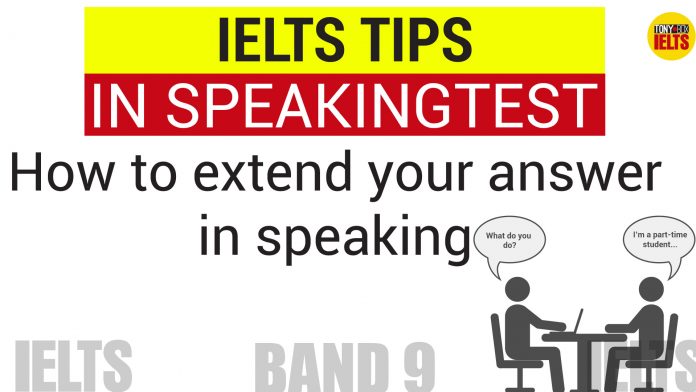How to Extend your answer in IELTS Speaking Part 1
When taking the IELTS exam, students often wonder whether the answers should be long or short. Frankly, there is no specific answer to this question, the answers should be ” enough”. So, how to determine the sufficient answer.
Firstly, the answer given isn’t too short because the examiner will judge how good English you can speak, so if you only answer by “ I like pop music”, your mark will be low. And vice versa, it shouldn’t be too long because the examiner won’t prefer to listen to the familiar topics for more than 2 minutes with each answer. In part 2 and 3, it’s time for you to show off your English ability to raise your band score.
Then, my advice for the length of an answer in part 1 shall be among the three sentences, more than 3 is not necessary. The most important point you should focus on is the use of key language in your answer.


Here are some tips to lengthen your answers and hope it works for you
Feelings and Opinions
It’s will be easier for you to extend your answer by adding the reason or showing the emotion about the question asked. It helps the examiner to understand clearly your answer
Question: What’s your favorite kind of music?
Short answer: I like pop music
Longer answer: I am in love with pop music because it helps me to feel better whenever I encounter difficulties
Read more:
- IELTS Speaking Part 1 – Topic: Hometown | Has your hometown changed much since you were a child?
- How to Get High Score in IELTS Speaking (BAND 9)
- How to prepare for IELTS Speaking Part 1
Contrasting Details
Another way to make your answer longer is simply using the contrast ideal by adding “ but/however/In contrast” to show the opposing idea
Question: Do you prefer living in a house or a flat?
Short answer: I prefer living in a house
Longer answer: I prefer living in a house with my family, however, when I get married, I think I will move to a modern flat to enjoy its smart facility
Combining Details
You can also add some detailed information for your answer with some linking words like “and, with, also, in addition, furthermore”
Question: What do you often do on weekends?
Short answer: I often clean my house
Longer answer: At the weekend, I often clean my house and cook for my family. In Addition, I also spend time talking with my parents about work and life
Past Comparisons
You can make your answer longer by comparing with what you use the past and what you take on at present
Question: What do you want to be in the future?
Short answer: I want to become a teacher
Longer answer: I used to wish to become a businesswoman when I was young, but I gradually fall in love with kids and decide to become a teacher.
Adding Reasons
Your answer shouldn’t be just an answer, you should give the reason for what you think or choose by using some words like ” because/for/since/due to…”
Question: which one do you prefer: go out for dinner or cook at home?
Short answer: I prefer cooking at home
Long answer: I prefer cooking at home because my mother is a good chef and she often teaches me how to cook delicious meals
Future
If something will change in the future, you can make use of the structure: will + verb or be going to verb
Question: What do you do?
Short answer: I work as a teacher
Long answer: Currently, I am working as a teacher at the primary school but two months later, I will move to the international school to teach Chinese students
Contrast opposing idea
Sometimes you will be asked to give the opinion about some matters. Remember to add “although/ though/ However…” to show that you consider both sides
Question: Do you play football?
Short answer: Yes, I really love playing football
Longer answer: Yes, I really love playing football, however, my mother often prevents me from playing that game for the silly reason “ I am a girl”
Giving Examples
By giving some realistic examples, your answer would be easier to understand and persuasive
Question: Do you and your sister have the same interest?
Short answer: No, we’re totally different.
Longer answer: No, we’re totally different. For instance, my sister is fond of playing the doll while I am in love with Japanese comics.
Frequency
One way to extend your answer is using some frequency words such as “often, usually, never, always”
Question: What do you do in the summer?
Short answer: I often go to the beach
Longer answer: In the summer, normally I go to the beach with my family. I and my mother often enjoy sunbathing while my father tries some sports games like waterskiing and snorkeling.
[Video]







